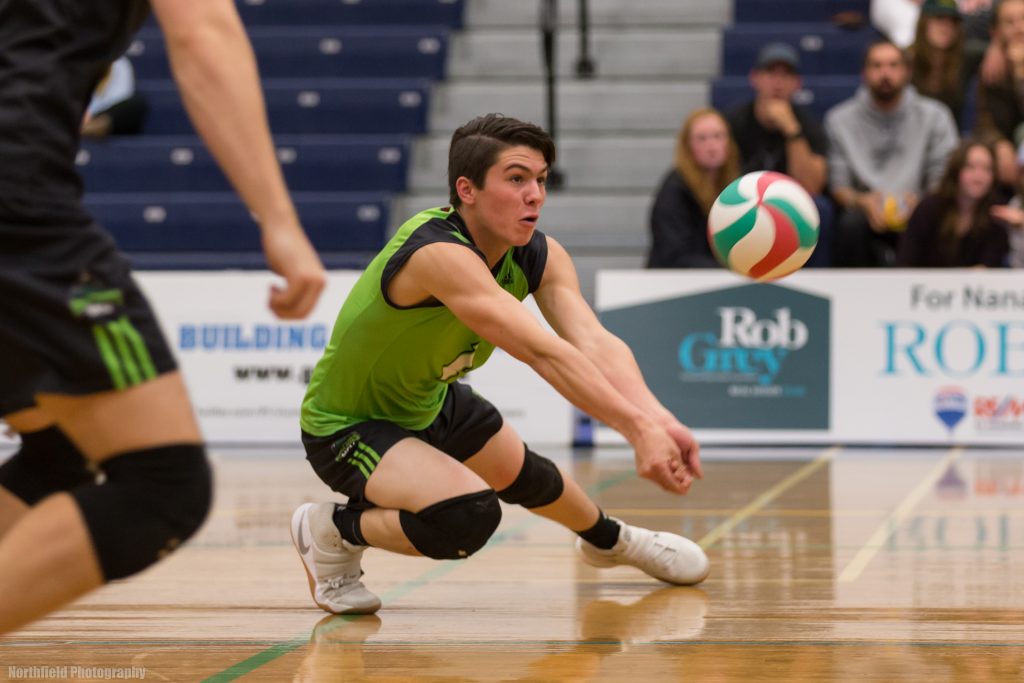
Cascades standout libero Isaiah Dahl was a PACWEST second team all-star last season. (Northfield Photography)
Cascades Q&A is a periodic web feature where we fire a series of questions (some serious, others not so much) at a Cascades athlete. In the crosshairs this week is Isaiah Dahl, a third-year libero with the men’s volleyball team.
Q: I understand you’re roommates with Joel Kleingeltink (Cascades fifth-year right side). Give us some dirt on Joel – what’s his worst habit as a roommate?
A: “Worst habits of Joel? You know what, he’s a good guy, pretty clean. But I’ve got to say, he’s on his phone a lot. I’ll be driving him home sometimes, and I’m like, ‘Joel, how’s it going?’ And it goes right over his head, he’s just texting or whatever. But other than that, we’re always bantering back and forth about who’s going to make the coffee the next morning or little messes.
“I have a dog that we live with, so because she makes more of a mess, I’m not nit-picky with Joel because I’m responsible for more of the problems around the house.
“But trying to think about dirt on Joel . . . he’s a solid guy, pretty easy-going. Actually, every night about 30 minutes after he goes to bed he gets up to pee. Like clockwork.”
Tell us about your dog – I see him a lot on social media. Is this a man’s-best-friend scenario?
“Yes, very much so. Her name is Bell, and she’s a three-year-old Chesapeake Bay retriever, which is a purebred duck-hunting dog. They’re kind of like a lab, but they’re not – they’re very different. She’s a very highly trained duck-hunting retriever – she spent four months in Montana going through a gun-dog training program while I was working as a fishing guide (last summer). I’ve got a lot of money invested in that dog, and she’s definitely like a child to me. I don’t know what type of 17-year-old kid goes and spends a whack of money on a purebred dog, but that was me. She’s a huge part of my life, and I spend a lot of time with her.”
So you do a lot of duck hunting, then?
“Yup, but not as much this season. I used to duck hunt in my free time before games. Last season in particular, me and Nick Bruce from the team and Grady Killick, who was our trainer last year . . . we all had Fridays and Saturdays off (classes), so we’d hunt and fish before games and then play that evening, then get up and do it again on Saturday. But my grandpa actually had a stroke last February, so in my free time I haven’t been going and doing those sorts of things. I’ve been helping him around his place.”
Tell me about this time you get to spend with your grandpa. Obviously it doesn’t sound like an ideal situation as far as the health problems, but it sounds like you’re making a priority of spending time together.
“Yeah – last February, he was down in Mexico on vacation and found out he’d had a stroke. . . . He lost a lot of his speech and some of the use of his right hand, but he can still close it. He just doesn’t have that finger dexterity. But he’s made some incredible progress for a 75-year-old man – he’s the only one I know who operates a chainsaw and climbs up trees. He’s a hard worker, and he’ll grit through anything.
“To make the story short, he couldn’t write at all with his right hand and he could barely speak. Now you can carry on a conversation with him, and he still spends 25 or 30 hours a week working around his property, landscaping or making fires or cutting wood or even welding. He’s quite the guy. So when I have free time, I like to go over there and help him split a cord of wood or help out wherever he needs.”
Tell me more about your time working at the fishing lodge over the summer. It seems to me that you had one of the more interesting off-seasons of any Cascades athlete – what did that job entail?
“I could talk about fishing for a long time if you really got me going! (Laughs) Ever since I was a young kid, I’ve been going up to this fishing lodge called the Queen Charlotte Lodge with my uncle and some family. The first time, I was probably 12 years old, and ever since then I’ve had this seed in me that I want to go work there. I never thought I was going to be able to make it work with a dog and with school.
“Last September, I went up there with family as a guest. The guides and managers there told me I should apply to work there the next year, so I did. I applied to be a fishing guide, and they said they didn’t have any spots available, but I could work on the docks. To be a fishing guide you had to get a week’s worth of courses, boating, those types of things. I decided to take those courses anyway, and sure enough, two weeks before I was supposed to go up there, they had a guy drop out so I was on the guide team. It all played out perfectly.
“For four months, I was a fishing guide in some beautiful country up there (on Haida Gwaii, off the coast of Northwest B.C.). Day-to-day, they offer a four-day trip and a three-day trip . . . so you don’t really have days off. You take people out each day – sometimes they want to go at 5 a.m., sometimes at 7 a.m., and you fish for 13 hours a day at times.
“You spend a lot of time talking about why you’re not catching fish! (Laughs) Some days are easier than others, but you learn to have good conversations and you meet a lot of interesting people. It’s a great atmosphere, and a lot of people you get really close with. There are about 130 staff, and they obviously all live up there. I think the longest stretch, I worked 55 days straight. Day in and day out, that’s a lot of fun. I had some big catches.”
What’s the most memorable fish story you’ve got from last summer?
“The best fish story I have, I was fishing with a couple of guys in Yacht’s Bay. You kind of have these periods where you try to find big fish, and other times where you try to find lots of fish. At this point, we were just looking for a big fish. It was slack tide, the water was moving just how I wanted it, and I was working along a kelp bed with lines on both sides. I turned around on a dime and came back along the same kelp bed, and brought my gear on the left side up to the surface. I had the line in my hands, and just as I was seeing my bait, I see this WHOOSH! This huge take right underneath the surface. I had to set the hook with my hand, and the fish was off, screaming away. I passed the rod off to my guests, and they played it back and forth in this bay for 50 minutes. We finally get it into the net, and after a quick call over to the fish master to get some pictures, it taped out to 61 pounds. That was a chinook salmon. That was my biggest one and the third-biggest fish of the year, and it won me a guide derby, which was nice.
“We do halibut fishing too, and the biggest halibut I guided was 185 pounds, which is six feet long. Big fish.”
When you showed up on campus this fall, I almost didn’t recognize you with your short hair (Dahl had sported a long, shaggy ‘do over his first two years on campus). Why did you grow it out in the first place, and why did you choose to cut it?
“It started as a thing in high school. In Grade 11, the volleyball guys didn’t cut our hair all season, and I thought it kind of looked good and ran with it. I got accustomed to long hair and really grew it out, and it turned into a part of me. The fishing lodge is why I had to cut it. To work up there, you have to have your appearance perfect – you’re clean-shaven every day, haircuts, top-notch. Now it’s short, and we’re working with it! But I like the change – it’s a little more professional, grown up.”
What were the reactions like when you came back with short hair?
“I was doing laps around the gym (on athlete orientation day) and everybody was like, ‘AAAAAAAAH!’ I ran in and didn’t even say anything, and people started noticing and freaking out. It was pretty funny.”
You’re one of the few Cascades student-athletes who’s been in the trades, and you’ve taken a bit of an interesting academic path.
“I didn’t even want to play varsity sports coming out of high school, but I was recruited towards the end of my Grade 12 year, and I thought, OK, this could be a great experience. I could play one year, have some fun, see a little bit of court, and then get on with my life and get into the workforce. There was an architectural drafting technician program that UFV offers, so I took that and it was a busy year.
“I started off as a redshirt which was a bummer because I wasn’t going to get any court time, but I got a spot on the roster halfway through the season, and then I started the last game of the (regular) season and at provincials I was starting. That was kind of ‘hook set’ for me in volleyball. I’m like, ‘OK, I’ve got to come back and do another year. This is too soon to finish it off.’ At that point in time, I was moving towards the finishing carpentry, construction, contracting side of things . . . and so I did an electrician’s apprenticeship program. And then last year (on the volleyball court) was a pretty phenomenal year for me, too – always improving, and getting a (PACWEST) second team all-star at the end of the year, too.
“So basically, at the end of last year, I figured I needed to do one more, and my family’s super-supportive. So I’m in a first-year business course.”
What are your hopes and dreams professionally when volleyball’s all done?
“This is my last year at UFV, last year of volleyball – for real this time! I was going to start a small business in rustic reclaimed finished carpentry, doing barn wood feature walls and things like that. And then in the last couple months, I’ve had a shift of passion and mindset. I’m doing a web development program in the fall after a season at the lodge. It’s a coding boot camp. I’m all over the place!”
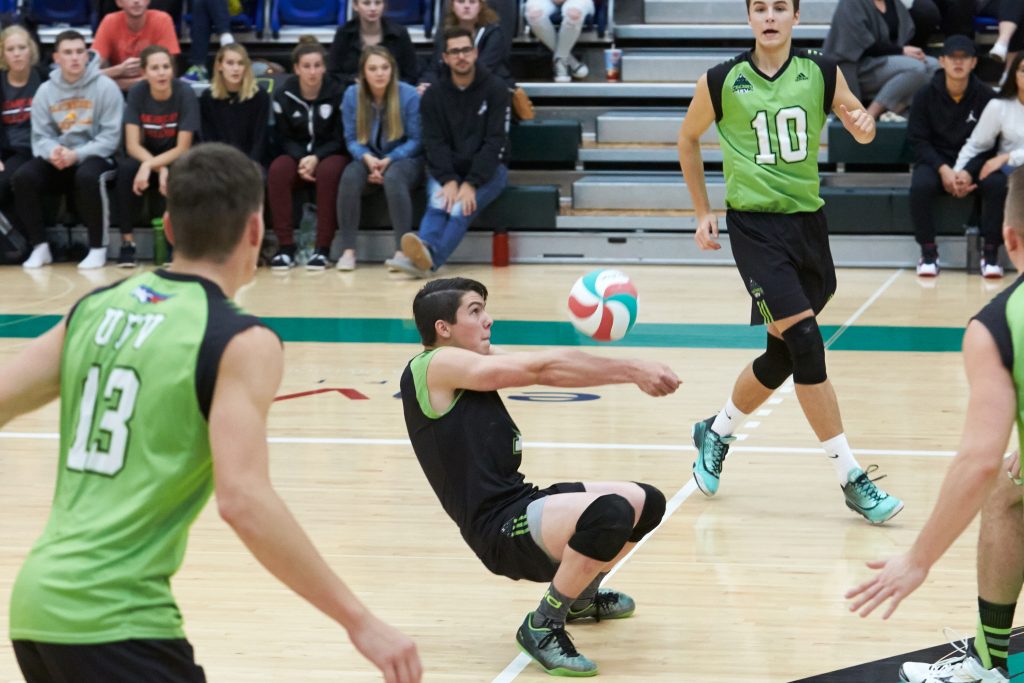
Isaiah Dahl is among the PACWEST leaders in digs. (Tree Frog Imaging)
Maybe I’ll ask you one volleyball question here. You’re a lot of fun to watch – you’re athletic and acrobatic, and some of the saves you make are phenomenal. What goes into those plays? Is it reflexes, is it natural ability, is it practice? How do you come up with some of these digs?
“I think it’s a lot of drive or want to just get the ball up. It’s a mindset I’ve had ever since high school – I’m not scared of the ball, the ball can’t hurt me. Well, sometimes it has hurt me, because I’ve taken a few concussions from the sport. But I have this drive that no matter what, I can get this ball up. If I can beat the ball to the floor, it’s going to come up. That mental drive that I want it bad . . . Obviously as a libero, I can’t change the outcome of the game in the sense of finishing the point. My drive, my passion comes from putting the ball up and making a good pass. I can have the best game of my life, and we can still lose the game – if we can’t put the ball away, then it doesn’t matter.”
Is that frustrating?
“It can be frustrating. But you have to learn to not let it be frustrating. If you’re doing a good job, you can’t let what you can’t control affect your mindset of the game. If I get frustrated I put more pressure on myself, and if I put more pressure on myself I’ll play worse, and it snowballs.
“I could go on about this for a long time.”
I think you nailed it.
Dahl and the Cascades volleyball teams host the Capilano Blues on Friday, Jan. 13 at the Envision Athletic Centre (women 6 p.m., men 8 p.m.).

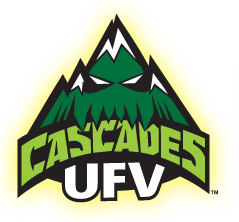

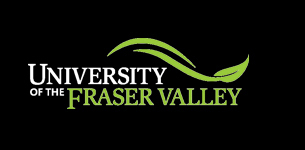

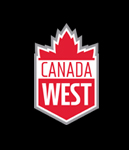
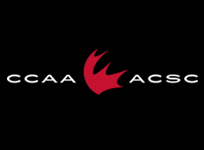
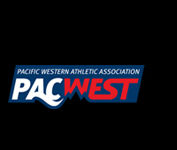

Comments are closed.